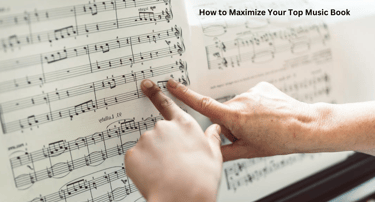How to Choose the Right Music Book for Your Instrument
Deciding the right music instrument
1/7/20254 min read


How to Choose the Right Music Book for Your Instrument
Introduction
Every musician knows that good tools are needed, and music books are no exception. This guide will help you make an informed decision, ensuring your learning journey is effective and enjoyable.
Know Your Instrument and Needs
It would be great to know exactly what you need before getting on a search.
• Self-Assessment of Skill: How good are you? If you're a beginner, you need booklets of books that make up your base. Experienced musicians would look for technique books or guides.
•Knowing Your Goal: Are you out there to entertain, for the presentation, or in the profession? This is why you should decide on a set of books based on your goals.
Knowing your instrument and aspirations will narrow your options and make your decision easier.
Types of Music Books for Instruments
Music books come in various types, each serving a different purpose.
• Instructional Books: This type teaches the reader to play the instrument; most times from the most elementary.
• Sheet Music Collections: These types compile songs or pieces, typically ordered by category and often difficulty level.
•Theory and Technique Guides: These advanced books will push you far into music theory and some advanced techniques to play your instrument.
o Books that cater to the genres you love be it classical, jazz, rock, or pop.
Author Expertise and Credibility:
o By authors who are musicians or educators, so you know you get quality content.
Books for Pop Instruments
1. Piano
•Recommended Book: Adult All-In-One Course by Alfred's Basic Piano Library.
•Why It's Great: Theory, technique, and practice all in one Book.
2. Guitar
Recommended Book: Hal Leonard Guitar Method by Will Schmid and Greg Koch
Why It's Great: For beginners, chording, scales, and all the most frequently played songs for guitar.
3. Violin
Recommended Book: Essential Elements for Strings by Michael Allen
Why It's Great: Structure with interactivities online.
••Why It's Great: It improves dexterity in using the hands in rhythm.
4. Woodwind and Brass Instruments
••Recommended Book: Rubank Elementary Method series.
••Why It's Great: Step-by-step progression for the beginner.
Features to look for in a good music book
1. Clear Instructions and Illustrations
o Pictures and diagrams aid in learning
2. Practice Exercises and Drills
The Book will give you how to implement what you have learnt
3. Resource Supplements
Use books having audio recordings, video tutorials and so on for demonstration.
Book for Beginners
• Piano: John Thompson's Easiest Piano Course
• Guitar: Teach Yourself to Play Guitar David M. Brewster
• Violin: Suzuki Violin School by Shinichi Suzuki
The books are great suggestions since one can use them without hassle or complication.
Recommended Books for Intermediate and Advanced Musicians
There is a need for some books that challenge the intermediate and advanced players to further their artistry.
• Piano: The Virtuoso Pianist in Sixty Exercises by Charles-Louis Hanon
• Guitar: Advanced Modern Rock Guitar Improvisation by Jon Finn
• Violin: The Kreutzer Etudes by Rodolphe Kreutzer
These titles will give more complex exercises and techniques for the professional musician.
Tips to Choose E-book or Hard copy
Advantages of E-book:
Portability: access your Book on any device.
Interactive Features: most e-books support audio and video.
Advantages of Hard Copy
Tangibility: easier to flip and annotate
Focus: Less distraction compared to a digital device.
Choose the format best suited for your lifestyle and personal preference.
Common Mistakes in Choosing the Best Music Book
1. Book too challenging is discouraging, and too simple, not challenging at all.
2. Review and recommendation are not considered. Reviews give the reader the best view of a book's effectiveness or suitability.
How to Maximize Your Top Music Book
1. Schedule practice: Consistency is the way to move forward. Take some time daily to practice.
2. Videos and Apps Attachment to the Books: Videos and apps supplement what you learn from a book.
3. Note-taking: Highlight the key sections and note your insights as you get practical experience.
Alternative Sources
If you want to add or complement what you are learning from your Book, consider the following:
•Online Course:Udemy and Coursera have entire courses about music.
•Word of Mouth: Look for people around or scour social networking websites for any source that may be relevant.
Reviews and Recommendations
Reviews and recommendations will save you hours of effort and pennies in cost.
• How to Review: Look for reviews that discuss content, ease of use, and productivity.
•Who to Trust: Look for Goodreads, Amazon or forums regarding music.
That is a good starting point for selecting the right instrument music book. Once you have considered your level, goals, and preferences, you can quickly identify the best Book to fulfil those needs. Whether it's a beginner's guide or advanced in its techniques, it will all differ accordingly. So take the time and just have fun seeing what's out there; just let the music guide you along the way.
1. How will I know which Book would suit my level?
Look at the book description. Does it have labels such as "beginner, " "intermediate," or "advanced?"
2. Is an e-book as good as the traditional Book?
Yes, e-books are just as valuable, especially with features such as audio or video.
3. Is it possible to learn an instrument using one Book?
In most cases, learning an instrument requires several materials, such as practice, tutorship, and different materials.
4. How often should I change my music books?
You should change the books when you feel you've mastered the previous one or need something new.



